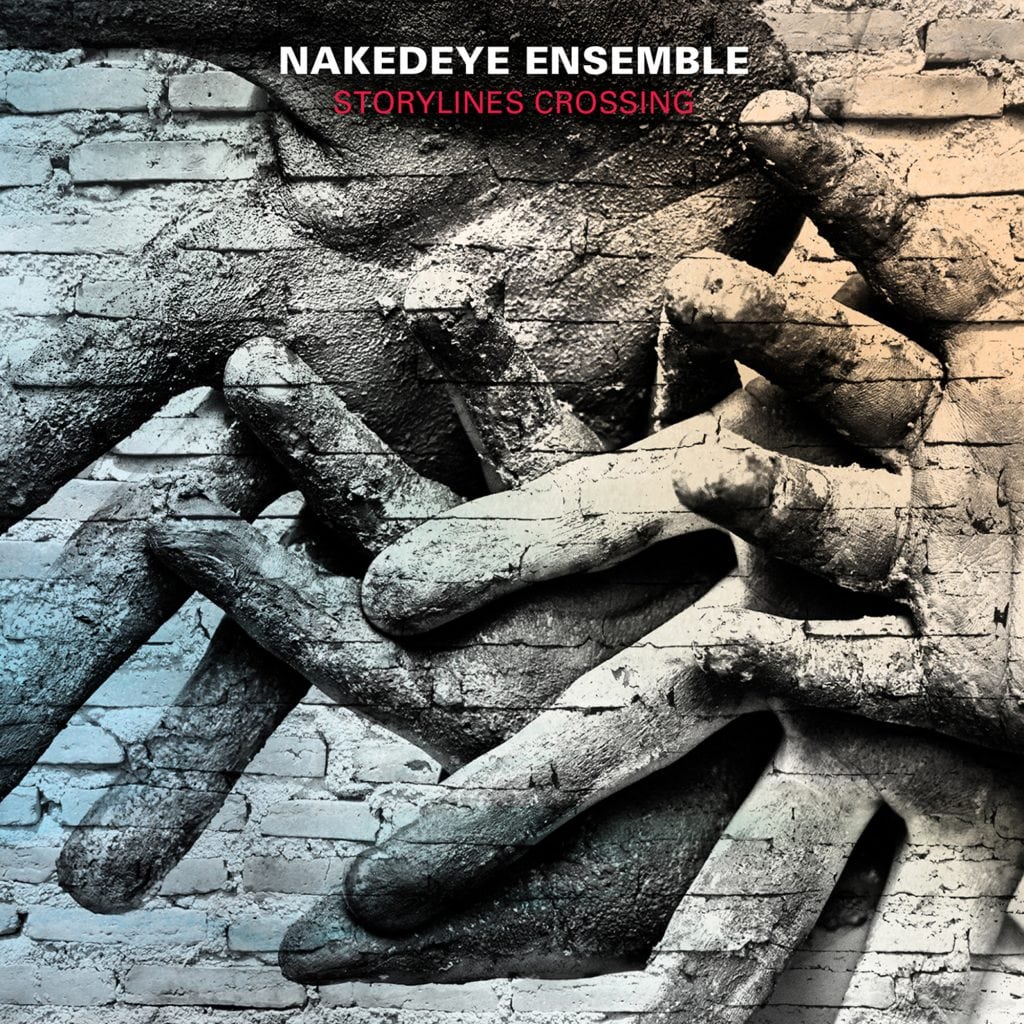By Anthony LaBat, Special to the Sybaritic Singer
NakedEye Ensemble, of Lancaster, PA releases their first record with Storylines Crossing. This ensemble is stacked with fine artists who on each track display a command of time as well as sensitivity to rapidly changing and diverse textures. The strongest parts of the album, such as Randall Woolf’s Punching the Clock, and Rusty Banks’ Surface Tension, are executed brilliantly, showcasing impressive technical dexterity and depth of musicianship. Five of the six works on the album receive their debut recordings, and feature themes from social activism to the idle play of two cats. Resounding throughout the whole of the album is NakedEye’s commitment to innovating through the merging of musical styles.
Given this mission and the solid performances on the album, pieces like Zack Browning’s Decade of the Dragon and Jonathan Russell’s Sextet stick out as lacking in luster. With a group that is operating on such a high level, I felt almost cheated by their programming early in the album. Russell’s Sextet does not develop so much as it re-situates itself around the first melodic material. This doesn’t make for jarring or interesting transitions, just uncomfortable ones. The piece is so saturated in its pitch material and at the same time so uninventive in its development that it leaves the listener confused, or bemused, and bored.
Decade of the Dragon, which reflects on the resistance and counterculture of America during the Vietnam War, continues this trend as the second piece on the album, and begins with an egregious introductory section. The beautiful drone in the first few seconds is immediately ruined at the entrance of the electric guitar, which carries the quotation of a traditional Vietnamese tune set underneath a gaudy piano accompaniment. The piece veers off into some of the most disorienting music of the album, not really merging styles so much as simply presenting them side by side. The music is at its best in its briefest and softest moments.
At times the presence of the electric guitar feels out of place. More often than not on this project, it simply provides highly rock-stylized solos over the group, and can border on outright cheesy at times. However, in Banks’ Surface Tension, the electric guitar is utilized more as a real element of the group sound. Rather than have the guitar as a primary solo instrument that “represents” a rock influence, Banks uses the timbre of the guitar as a tool for colorful interjections and gestures. The program notes aptly use the words “sonic viscosity” to describe this piece, and the ensemble is excellent in its treatment of minute adjustments in the instrumentation over time.
Storylines Crossing is potent in rock, blues, and jazz styles. The various backgrounds the group brings are realized brilliantly in Woolf’s Punching the Clock, inspired by the ‘work songs’ of the globe. Richard Belcastro’s Smoke n’ Wid provides refreshing contrast in that it is above all else just cute. Soloist Chad Kinsey is pleasantly buoyant and rhythmically solid here, which makes the dovetail into the raucous second section of the piece all that much more impressive.
Richard Belcastro’s arrangement of Fred Rzewski’s Coming Together closes the album. The piece was written in 1971 following the prison rebellion at Attica Correctional Facility. It was written for any number in any combination of instruments and uses the text from a letter of Sam Melville’s. Sam Melville was one of the principal architects of the rebellion, which was sparked in resistance to dismal living conditions, racial and political persecution, cruel and unusual punishment in the form of beatings by correctional guards, and labor exploitation. Naked Eye’s founder and pianist says of the project:
The actual words do not reference jail specifically and the idea of taking the piece out of its incarcerated context into a metaphorical plane appealed to me. We all live in some kind of real or imagined prison from which we try our whole lives to be free. [Belcastro] rose to the challenge, creating a meta-Coming Together version that speaks to us as humans living in the 21st Century.
Therein lies the rub. While the piece undoubtedly belongs on this program, and while the arrangement is fantastic, the intent behind programming it was to remove it from the context of the Attica rebellions in order to focus on personal prisons. This was done in order to create a different interpretation that specifically resonates “to us as humans living in the 21st Century”, and so this I feel is a missed opportunity. This statement and this intention negate the fact that prison reform is still an incredibly relevant issue as is. There are a lot people that actually do live in prisons, and this piece was written for them. There is no need to take it out of its original intention because all of the messages of this piece continue to be mirrored in contemporary politics.
This album will debut in a time when scrutiny of our prison and our criminal justice system is at a historical peak. It is important to know that the rebellion occurred in September of 1971 and Rzewski completed the piece in the same year. He was consumed by the “incarcerated context” he was living and felt the need to take a stance of solidarity with those incarcerated. Yet, very little has changed since. This piece was written before the Anti-Drug Abuse Act of 1986, you know, when mandatory minimums got out of control, leading to the disproportionate incarcerations of people of color. I would say that the piece needed very little arrangement to be relevant to 21st century humans. That is why I say a missed opportunity. This statement (by proxy the selection of this piece) could have brought awareness and empowerment to a disenfranchised community, and instead, prisoners and their civil rights are abandoned in lieu of our own personal prisons, real or imagined. That being said, Coming Together was performed beautifully on this album. This performance is just cool. The use of electronics situates the text and unifies the ensemble in striking ways.
This was a thrill to listen to, but if contemporary musicians want to be relevant and honor a piece of music with a fresh perspective, we have to go beyond that and represent where it counts.
Overall this is a good album. The music is performed with care and precision, and NakedEye puts forth a bold mission statement. This group sees contemporary (dare I say classical) music in a place that not many groups do, and that’s something to treasure and cultivate. The trend this album represents and the strong thread carried by its selections are aspects to look forward to in coming albums from this group.
 Anthony LaBat is a flutist, writer, and archivist working out of Kansas City, Missouri. A devout fan of the weird and “going down that rabbit hole”, he is also tragically obsessed with details and their context. Anthony serves as Production Coordinator and flutist for newEar Contemporary Ensemble, and sees music making as an act of community engagement. In writing, artists can empower each other through meaningful dialogue and criticism. Through meaningful dialogue and criticism, artists have limitless opportunities to widen perspectives, welcome new ones, and help each other create art that engages the whole of our community.
Anthony LaBat is a flutist, writer, and archivist working out of Kansas City, Missouri. A devout fan of the weird and “going down that rabbit hole”, he is also tragically obsessed with details and their context. Anthony serves as Production Coordinator and flutist for newEar Contemporary Ensemble, and sees music making as an act of community engagement. In writing, artists can empower each other through meaningful dialogue and criticism. Through meaningful dialogue and criticism, artists have limitless opportunities to widen perspectives, welcome new ones, and help each other create art that engages the whole of our community.

